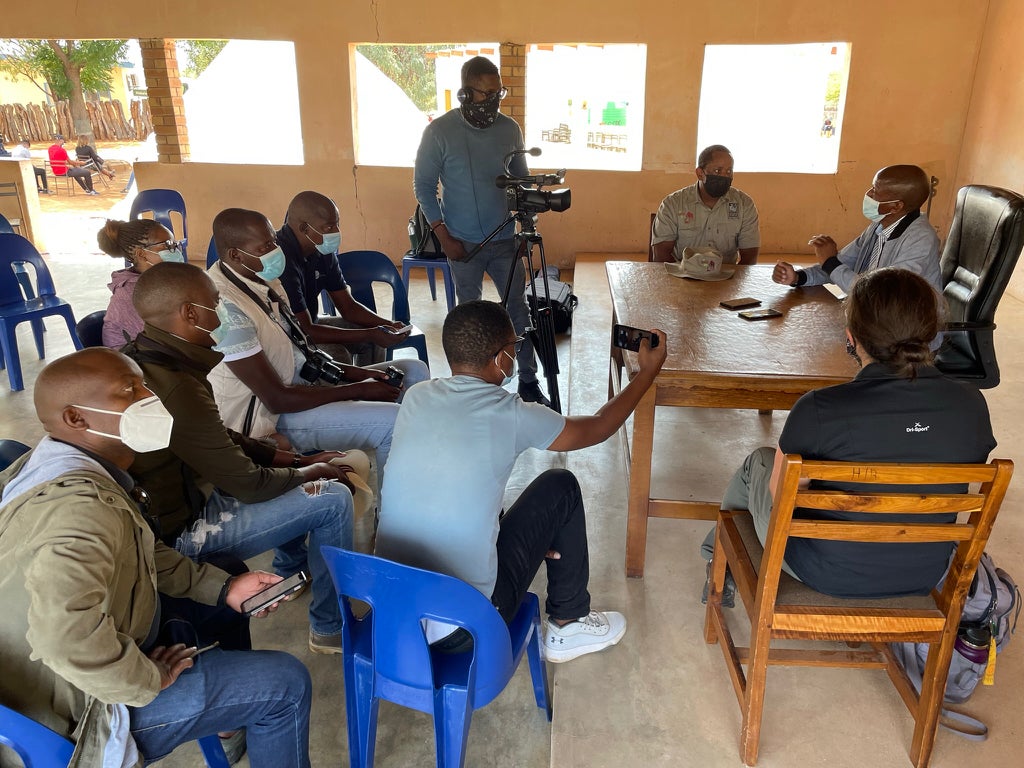Conservation journalism programme expands to southern Africa
More news on wildlife crime and conservation drives greater popular support to protect nature

Your support helps us to tell the story
From reproductive rights to climate change to Big Tech, The Independent is on the ground when the story is developing. Whether it's investigating the financials of Elon Musk's pro-Trump PAC or producing our latest documentary, 'The A Word', which shines a light on the American women fighting for reproductive rights, we know how important it is to parse out the facts from the messaging.
At such a critical moment in US history, we need reporters on the ground. Your donation allows us to keep sending journalists to speak to both sides of the story.
The Independent is trusted by Americans across the entire political spectrum. And unlike many other quality news outlets, we choose not to lock Americans out of our reporting and analysis with paywalls. We believe quality journalism should be available to everyone, paid for by those who can afford it.
Your support makes all the difference.Read the news or tune into a TV documentary in the West and African conservation stories are likely to feature wildlife roaming national parks, rangers battling poaching, or zoologists warning of species extinction.
In Africa, the coverage has been very different. Here, elephants or buffalos trample penniless farmers’ crops, forcing them into the arms of poaching gangs. Productive land is wasted on foreigners watching wildlife. Development is delayed in the name of nature.
As the continent’s population doubles in the coming 30 years, public pressure will increase for land to be used for farming or human settlement. Protecting habitats only for wild animals or nature can easily be framed as indulgent, of no benefit to local people or their governments.
In this context, ‘conservation' has been a topic riven with misunderstandings, poorly-understood nuances, and conflicts. These can be maliciously exploited by powerful people and amplified by a misled media, causing permanent but avoidable damage to society, ecosystems, and economies.
Today, things are changing. There is a growing awareness in Africa’s news media that conservation is about much more than endangered wildlife. It is about protecting, preserving, or restoring nature so it can go on supporting human as well as animal life.
In part driven by increasing global demand for sustainability, conservation is increasingly framed in news articles as an emerging economic sector with huge potential commercial, environmental, and social advantages to wider society.
Nature-based business can earn local people and national exchequers significantly greater long-term dividends than, for example, subsistence farming. Wildlife and environmental crime is not the destitute acting to make ends meet, as it has been framed, but a global illegal scourge that “steals from us all”, in the words of one African-led campaign.
This shift is recent, and so far limited. What’s needed to accelerate it is to support Africa’s growing band of specialist journalists covering conservation, the environment, and climate as they increase their output and bring more stories of conservation’s value to their audiences.
Since 2018, I have run a programme with Space for Giants working with conservation reporters in Kenya and Uganda.
Building on that, the United States Agency for International Development (USAID) has now launched the African Conservation Journalism Programme, through its VukaNow activity to combat wildlife crime in southern Africa. Space for Giants will implement the programme, under my direction.
We will gather 24 professional reporters working for national media or those with large local audiences, in Angola, Botswana, Mozambique, and Zimbabwe. We will run training workshops, link them to new contacts, mentor them as they work on stories, and, crucially, provide the funding that their newsrooms struggle to find for a topic - conservation - that is still not a priority.
The journalists will continue to work for their newspapers, and television and radio stations, with a renewed focus on wildlife crime, conservation, and environment stories. Anyone working in that sector can contact us to connect directly to specialist reporters who really understand the issues.
Supporting conservation journalism in Africa does two things. First, readers, listeners, and viewers in each of the countries where the programme runs will come across more stories, more compellingly presented and even more accurately and objectively reported, about why protecting nature matters, economically as well as ecologically.
If more people encounter more independent, balanced, comprehensive journalism covering conservation, then they are more likely to support efforts to combat wildlife crime because they better understand its costs to them, their families, their communities, and their countries.
Second, we will help amplify African voices in the international debate about conservation, wildlife, and nature. For too long, this debate took place with the continent nearly silent. That created the disconnect between how these topics are framed outside Africa versus how they are seen here.
That’s why you’re reading this. The best of the stories the journalists produce during their time in the Program will be republished here on The Independent, thanks to its connection to Space for Giants.
This brings those African perspectives and voices to a potential global audience of 120 million people. You can read those stories here.
Already, the programme has launched in Botswana and Zimbabwe. It will expand soon to Mozambique and Angola. It is remarkable how dedicated and passionate the reporters in each country are about their ‘conservation’ beat. All that is needed is to underwrite that passion with the support this Program brings, and stand with them as they bring their stories to many more people.
Learn more about the African Conservation Journalism Program here.
Join our commenting forum
Join thought-provoking conversations, follow other Independent readers and see their replies
Comments